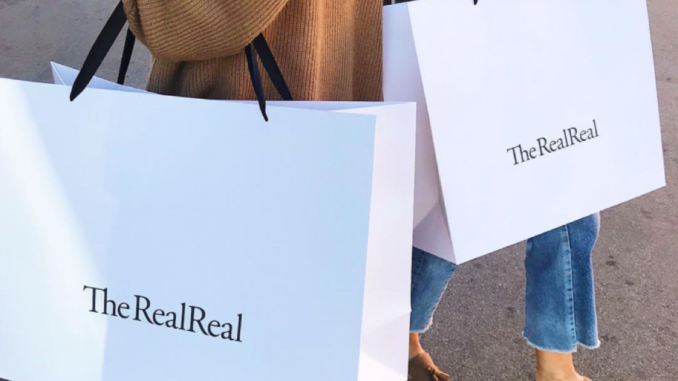The growth of secondhand e-commerce has been one of the biggest shifts in the retail industry in recent memory, and sites like The RealReal are becoming the go-to for fashionable, sustainably-minded, savvy shoppers as more people than ever are buying resale. With only an eight-year tenure under its belt, The RealReal is leading the charge in this movement, focusing on sustainability, authenticity and the continued lifecycle for luxury items; and with two storefronts across coasts – The RealReal NYC opened in November 2017, and a beautiful second store launched in West Hollywood in July 2018 – the retailer is part of a market making waves around the world.
According to a 2018 report covering the state of the resale industry, shoppers are savvier than ever, opting for secondhand at accelerating rates as options and experiences expand. The past few years have overseen the rise of resale and other “disruptors” in the market – these online retailers make it easier than ever to buy, rent, subscribe, purchase or resell than ever before. Along with this shift, buyer preferences and behaviors are rapidly changing. Think of it like this – buying a new Gucci handbag may have seemed farfetched in 2009, as there weren’t many options outside of buying in the primary market; but in 2019, The RealReal offers thousands of options at your fingertips, and buying that Gucci handbag secondhand lowers the price for the savvy shopper and also feeds into the consignment lifecycle model, with promise of the possibility to resell later. This focus on creating new lifecycles for luxury items gives quality pieces new life, offers consumers more leverage (and a better wardrobe!) than ever before. The modern closet is undergoing a powerful transformation, and resale is a key driver.

The RealReal, a San Francisco-based luxury consignment retailer, got its start in e-commerce in 2011 when Julie Wainwright – an early dot-com entrepreneur, who previously held the CEO roles for Reel.com and Pets.com – set her sights on pre-owned luxury goods. Since then, the popularity of The RealReal has skyrocketed along with luxury resale as a whole. The site, itself – rife with pre-owned collections from the world’s leading designers, Cartier and Rolex watches, Gucci and Louis Vuitton bags, Chanel and Tiffany’s jewelry, and dazzling shoe collections from Manolo Blahnik and Christian Louboutin – helps to solve modern challenges surrounding sustainability in the retail industry, closing an important loop in the fashion system. According to The RealReal, resale is pioneering new terrain in actively extending the lifecycle of a huge number of products that may or may not have ended their “primary” lifecycle in a landfill. Additionally, the modern insights offered by The RealReal give a transparent look at the market – consumers can easily track the value of products they buy and sell, leading to more retail purchases in the primary market.
Resale is Going Mainstream
The resale industry reported a 49% growth for “industry disruptors” from 2017-2018, edging out its nearest growth competitor (traditional resale) by +40% and squashing all apparel retail at a growth rate 24x faster. While one in three women reportedly shopped secondhand in 2017, resale claimed a $20 billion piece of the industry – that number is expected to skyrocket in the years to come, as the resale market is estimated to hit $41 billion by 2022, claiming a share of more than 10% of the global industry. Modern closets mirror these metrics – while 2017 reported thrifters housing 24% of used merchandise in their closet spaces, 2022 is estimated to jump to 40%.
Secondhand ≈ Sustainability
As the second-most polluting industry in the world, surpassed only by petroleum, the fashion industry has been in dire need of initiatives focusing on sustainability for decades. Fast fashion drives demand for nonstop manufacturing, which contributes to the fashion industry’s incredible waste. This, alongside changing trends and low-quality items leads to throw-away items ending their lifecycle in the landfill. With the rise of luxury resale, quality, previously-loved items get a chance at extended lifecycles, reducing their carbon footprint. Buying a used item extends clothing lifecycle on average 2.2 years, which in turn reduces carbon, waste and water footprints by a whopping 73%.

The RealReal Redefines Resale
As for The RealReal model of resale, consider this: listed among the hundreds of thousands of pre-owned garments and accessories on the site, there are currently about 25,000 “new with tags” items – gorgeous new Hermès and Chanel handbags, right off the runway; limited edition 2018 collaboration sneakers from Off-White x Nike; Gucci bags and threads galore, complete with emblematic logo; supple leather jackets from Saint Laurent; Louis Vuitton boots, monogram bags and t-shirts; Balenciaga silk dresses; the Yeezy nude stilettos and clear thigh-highs made famous by Kim K., and so much more – all new, pristine, with tags and often discounted. While many brands have yet to disclose rumored work with The RealReal, the practice of off-loading unsold seasonal merchandise to secondary retailers is not uncommon; and an executive for Kering – the Paris-based parent company of Gucci, Balenciaga, Saint Laurent, Bottega Veneta and others – revealed recently they were collaborating with the retailer, likely explaining a slew of “new with tags” merchandise.
It’s apparent that resale is thriving, but the speed at which it may overtake other markets – including the demise of department stores and fast fashion outlets like Forever21 and H&M – is astounding. At the heart of the consignment model, there’s a “revolving door” idea of selling old items to make room for new, and whether that’s for the eco-conscious millennial consumer or for the ne’er-outfit-repeater of the Instagram variety, this idea of giving items new life by giving items new homes is inherently sustainable and already having a massive environmental impact globally. As industry leaders like The RealReal grow in their scope, so too will product offerings and availability, fueling this cyclical economy that is allowing us to shop like never before.


